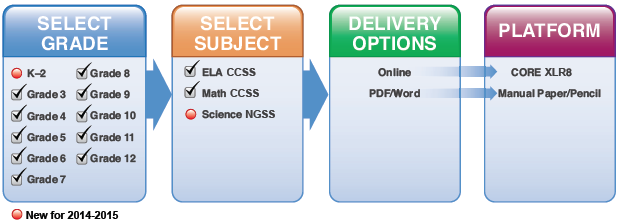Anatomy of our Universal Screener
Screener Assessments have a large grouping of items that address a broad range of cognitive constructs at varied depth levels, from knowledge to evaluation. Our test items have been calibrated for grade and subject appropriateness and work together to yield a better view of students’ cognitive abilities.

Why deliver Screeners with Ed Tech Soft’s XLR8?
Using Ed Tech Soft’s XLR8, educators can administer Screeners in a single class, across an entire
grade, throughout a school, or across an entire district. Teachers and administrators have instant access to reports that measure and diagnose:
- Instruction readiness
- Weak strand-level areas
- Baseline learning levels
- Measure students’ cognitive growth over time
- and much more
Common Core aligned Universal Screeners in Math and ELA
These are brief assessments used to identify students who may be at risk for difficulties in a broad range of curriculum-based skills in Mathematics and ELA. Their primary purpose is to predict for teachers which of their students may need additional instruction in order to meet their grade-level goals.
- E/LA: Grades K-12; Math: grades K-12; NGSS: Coming 2018-2019
- 3 per year: Fall, Winter and Spring
- 40 minutes per assessment (Configurable)
More About Our Universal Screeners
Universal Screeners are assessments used to determine student readiness before engaging in a new body of instruction. In states or districts that may already have a benchmark/standard assessment solution for discovering skill gaps, our screeners supply a deeper level of detail that educators need to effectively pinpoint interventions.
Assuring Accessibly
Ed Tech Soft’s methodology for Universal Screeners enables educators to determine if students are on-track or at-risk for meeting expectations. Our reporting features also help educators calibrate the intensity of instructional supports or supplemental interventions needed for students who are at-risk for not meeting expectations. Our Screeners are grounded in psychometric research, characterized by state-of-the-art items that are not biased toward students with ELL or Special Education identification.
Our test items are developed to exhibit two state-of-the-art characteristics that contribute to item validity and form an essential foundation for test reliability: transitory knowledge representations and principals of universal design as promulgated by the Individuals with Disabilities Education Act (IDEA). Items are written to embody these two characteristics and are intended to engage a population of students who possess varying stages of development for a particular focused outcome – who would otherwise be denied access to the test items’ content due only to superfluous language or reading contextualization.
The Universal Screener test design provides a framework of items distributed across three levels of cognitive demand that is congruent to the stages of knowledge representation of a targeted outcome.
Ed Tech Soft’s validity and equating statistics are analyzed using a multi-stage process involving Classical Test Theory (CTT) and Rasch IRT. During CTT, proportion correct, point-biserial, and biserial statistics are reviewed for problematic items that require removal prior to item fit analyses, dimensional analyses, and b-parameter estimation using Rasch IRT.
